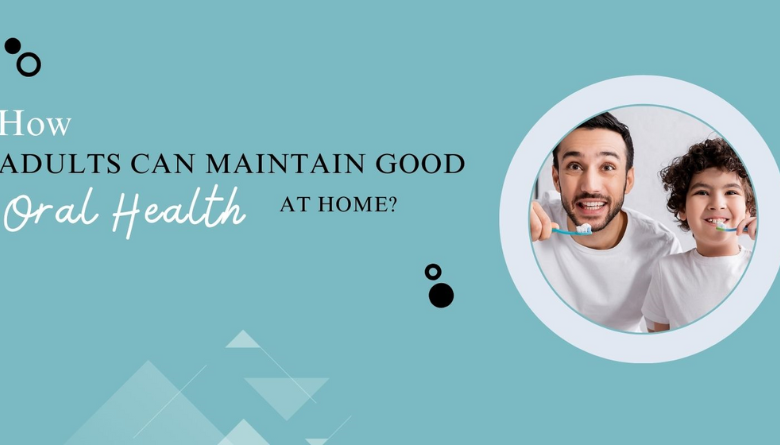How Adults Can Maintain Good Oral Health at Home?

We at Smile Clinic London believe in helping you maintain a healthy mouth and strong teeth for a lifetime. Here are some essential steps you can take with the guidance of our expert Smile Dentists in London to achieve this goal.
What is oral hygiene?
Oral hygiene involves maintaining a clean and disease-free oral cavity by regularly brushing teeth and adopting good hygiene habits. Consistent oral hygiene practices are vital to preventing dental diseases and bad breath. Regularity is key to its effectiveness.
What health conditions are connected to oral health?
Now days oral health is linked with other health conditions in human body, including:
Diabetes: Diabetes also creates difficulties for the human body to fight off oral infections. Diabetes develops conditions like dry mouth in adults. Which may increase the risk of cavities buildup in the mouth.
Respiratory infections: Person with bad dental hygiene is more likely to grow breathing issues. This is because of dental bacteria from the mouth which can move to the lungs and cause breathing infection.
Pregnancy complications: Pregnant women with bad oral health and gums create complications in pregnancy, such as early birth of child or with low birth weight. This is because of the infection from gum disease can travel to the place and affect the growth of the baby.
How to advance your oral health?
There are a number of steps you can follow to improve your poor oral health, Which includes the following:
Brush your teeth once a day with fluoride containing paste for two to three minutes daily. Use soft-bristled toothbrushes and fluoride containing toothpastes which less damage your teeth enamel and gums.
- Ensure you floss daily to eliminate plaque and food remnants stuck between your teeth.
- Maintain a nutritious diet while minimizing your intake of sugary food and beverages.
- Make it a habit to see your dentist for routine dental examinations and professional cleanings.
What are the indicators of inadequate oral hygiene?
There are numerous signs that could point to poor oral hygiene, such as bleeding gums, tooth decay, persistent bad breath, loose teeth, receding gums, lingering mouth sores, toothaches, and jaw swelling. Conditions like gingivostomatitis, an oral infection triggered by particular bacteria or viruses, can also suggest insufficient oral care.
How can I enhance my oral hygiene?
Ensuring consistent and excellent oral hygiene practices is vital for maintaining healthy teeth and gums.Here are some important instructions that helps to keep your smile more vibrant:
Caring for your dental health is crucial to maintaining strong teeth and gums throughout your life. Here are essential practices to ensure excellent oral hygiene:
Brush Regularly:
Brush your teeth a minimum of twice daily employing fluoride toothpaste and a toothbrush with soft bristles. Cleanse all areas of your teeth, encompassing the back and sides, ensuring to hold your toothbrush at a 45-degree angle against your gums for efficient plaque removal.
Floss Daily:
Flossing is crucial for cleaning the spaces between your teeth where your toothbrush can’t reach. Use dental floss, interproximal brushes, or dental picks to clean between your teeth once a day.
Clean Your Tongue:
Don’t forget your tongue, which harbors bacteria. Brush your tongue gently with your toothbrush or use a tongue scraper to remove bacteria and keep your breath fresh.
Use Mouthwash:
An antibacterial mouth rinse can help to kill risky bacteria, reduce dental plaque buildup, and freshen your breath. Choose an alcohol-free mouthwash to prevent from dry mouth.
Visit Your Dentist:
Routine dental check-ups are very important for better oral health. Visit your dentist in London at least twice a year for checkups and dental cleanings. Your dentist can detect oral issues early and guide for professional cleanings to remove plaque and tartar buildup from the teeth.
Avoid Tobacco Products:
Smoking Cig and other tobacco congaing products can lead to oral disease and mouth cancer. It is best way to quit or avoid these smoking habits altogether.
Limit Alcohol:
Excessive alcohol consumption can harm your oral health. Limit your intake of alcoholic drinks to promote good oral hygiene.
Manage Dry Mouth:
If you suffer from dry mouth due to medication or other reasons, drink plenty of water, chew sugarless gum, and avoid tobacco and alcohol. Consult your doctor for alternative medications if dry mouth persists.
Monitor Changes:
Be vigilant about changes in your oral health. If you notice bleeding gums, chronic bad breath, loose teeth, mouth sores, or swelling of the jaw, consult your dentist promptly.
Consider Your Overall Health:
Understand the connection between oral health and your overall health. Conditions like diabetes, cardiovascular disease, and pregnancy complications can be influenced by oral health. If you have specific health conditions, discuss their impact on oral health with your dentist.
Remember, prevention is key to maintaining good oral hygiene. By following these steps and seeking regular dental care, you can enjoy a healthy mouth, a beautiful smile, and overall well-being.
Which oral hygiene products should I use?
When choosing oral care products, look for the ADA Seal of Acceptance over there. This seal is awarded by the American Dental Association, indicates that the product has go through rigorous testing and agreement by experts in microbiology, toxicology, pharmacology, and chemistry. Additionally, consult our smile dentist for personalised product recommendations based on your specific needs.
What are the benefits of good oral hygiene?
Practicing a better oral hygiene provides various health benefits, including healthy teeth and gums, a beautiful natural smile with fresh breath. Routine oral care also reduces the risk of oral cancer. Additionally, At Smile Dental Clinic in London, preventive dental care is cost-effective than restorative or emergency dental care procedures. The process saves time, stress, and money as well in the long run.




